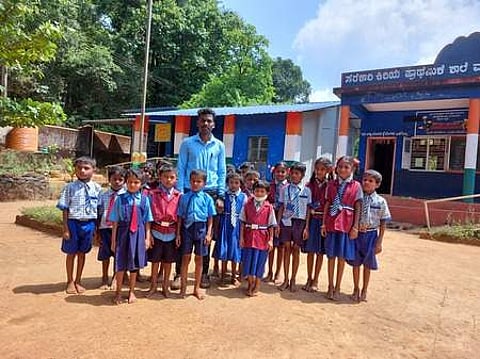

The Waghbandh school in Joida taluk is a model to the rural schools of the state, which, despite not having a permanent teacher, has shown the way on how to keep going as the villagers themselves have been educating their wards by providing them life skill education that can sustain their lives rather than wait for the appointment of teachers. The COVID-19 pandemic has not just left the students' education stagnated, but also has schools deprived of teachers. The result — the villagers have been worried about how the children will fare better.
“There are many villages here that do not have teachers. We have brought this matter to the notice of top officials, including the Deputy Commissioner of Uttara Kannada. But all we have got is just assurance,” Ravishankar Derekar, a villager here, told TNIE. The villages around Waghbandh like Shirola, Pathagudi, Bamane, Maire, Soliye, Asuli, Kanne, Karanjoida, Teloli, Kheloli, Kharsinga, Rundali and other villages are without teachers. However, the Deriya villagers, whose children study at Government Primary School Waghbandh, took a different approach.
The school at Waghbandh has about 17 students, who, despite the odds, attend the classes conducted by Nivas Gouda, a guest teacher — the makeshift arrangement by the education department. He teaches students from Grade I-V in one single class. The school had a teacher called Leeladhar Moger, who began several activities to connect the students with Earth. As a result of this, the school with just one building as a classroom is full of greenery. Having served as a teacher here, Leeladhar involved the students in farming and horticulture activities.
“He taught the students about agriculture, planting horticulture trees and nurturing them and so on. We are continuing the same. Since our children have a lot of time without regular classes, we take them to plant saplings, to show them cultivation of vegetables, particularly our tubers, fruit bearing trees, paddy and sugarcane,” Yogish Derekar, another villager said. Accordingly, the vegetables cultivated here are used for mid-day meals and fruits like jackfruit, pineapple, guava, mango, rose apple, chikku and other fruits are distributed among the children. “There are many fruit bearing trees here, we remove the fruits in such a manner that it will not be exhausted immediately. For instance, we harvest them in a few trees until a portion of fruits are left for birds and animals. It is the same with jackfruit trees. As a result, we see many sloth bears, deers and sambars around our fruiting trees,” informed Ravishankar.
The 58-year-old school has adopted a policy that any student leaving the school should plant a tree and nurture it throughout his life. Priyanga, Chief Executive Officer, Zilla Panchayat, Uttara Kannada District, said that the rationalising of teachers is on. “The Education Department authorities are already working on directing teachers to those schools where there are very few or no teachers. The teachers will be appointed soon,” she said. However, she said that the existing teachers will be re-shuffled and there will not be any new appointment.
